- Home
- J. R. R. Tolkien
The Story of Kullervo Page 2
The Story of Kullervo Read online
Page 2
In the above-mentioned letter to Waldman Tolkien expressed his hope that his invented myth would leave scope for ‘other minds and hands wielding paint and music and drama’ (Letters, pp. 144–5). He might have been thinking of Kalevala here also, for his reference to paint and music and the scope for other hands may well be an allusion to the translations of Kalevala material into paint and music by other artists who found in it inspiration for their art. Two prominent examples are the classical composer Jan Sibelius and the painter Akseli Gallen-Kallela, two of the best-known Finnish artists of the late 19th and early 20th century. Sibelius mined Kalevala for his orchestral ‘Lemminkainen’ and ‘Tapiola’ suites and his longer ‘Kullervo Suite’ for orchestra and chorus, turning myths into music. Akseli Gallen-Kallela, Finland’s foremost painter of the modern era, produced a series of scenes from Kalevala including four paintings illustrating key moments in the life of Kullervo. The popularity of this character, and his attraction for artists, suggests that he can be seen as a kind of folkloric embodiment of the violence and troubled irrationality of the equally troubled modern age. It does not take a great stretch of imagination to see Tolkien’s Túrin Turambar, a product of the same war-torn age, in the same light as the same sort of hero.
The narrative trajectory of Tolkien’s story follows closely runos 31–36 in Kalevala. These were titled in Kirby’s translation, ‘Untamo and Kullervo’, ‘Kullervo and the Wife of Ilmarinen’, ‘The Death of Ilmarinen’s Wife’, ‘Kullervo and his Parents’, ‘Kullervo and his Sister’, and ‘The Death of Kullervo’. Although presented as separate poems, they comprise a coherent (if not always fully integrated) sequence telling the continuous story of a catastrophic quarrel between brothers, which leaves one brother dead and the other the murderous guardian of the dead brother’s newborn son, Kullervo. Mistreated and abused by both his guardian and the guardian’s wife, the boy survives an unhappy childhood including three attempts at his murder – by drowning, burning, and hanging – and ultimately exacts vengeance on both of them, but is himself subsequently destroyed by his discovery of his unwitting incest with a sister he did not recognize until too late. Tolkien’s treatment deepens the story, prolonging suspense and adding both psychology and mystery, developing the characters while preserving and enhancing the pagan and primitive qualities that first attracted him to Kalevala.
The Story of Kullervo exists in a single manuscript, Bodleian Library MS Tolkien B 64/6. This is a legible but rough draft, with many crossings-out, marginal and above-the-line additions, corrections, and emendations. The text is written in pencil on both sides of thirteen numbered bi-fold foolscap folios. The main narrative breaks off abruptly halfway down the recto of folio 13, at a point about three-quarters of the way through the story. It is followed on the same page by notes and outlines for the remainder (Plates 4, 5), which fill the rest of the space and continue on to the top portion of the verso. There are in addition several loose sheets of variable size containing what are clearly preliminary plot outlines, jotted notes, lists of names (Plate 3), lists of rhyming words, and several drafts of one long verse passage of the story, ‘Now in sooth a man I deem me’. If, as appears likely, MS Tolkien B 64/6 contains the earliest and (aside from the note pages) the only draft of the story, Tolkien’s revisions on this manuscript must stand as his final ones.
I have left intact Tolkien’s sometimes quirky usage and often convoluted syntax, in a few instances adding punctuation where necessary to clarify meaning. Square brackets enclose conjectural readings and words or word-elements missing from the manuscript but supplied for clarity. His use of diacritical marks over the vowel – chiefly macron but also occasionally breve and umlaut – is also inconsistent, attributable more to speed of composition than intentional omission. False starts, cancelled words and lines have been omitted, with four exceptions. In these instances, wavy brackets enclose phrases or sentences cancelled in the MS but here retained as of particular interest to the story. Three such cancelled passages give evidence of Tolkien’s long preoccupation with the nature of magic and the supernatural. The first two occur in the opening sentence. These are: 1) ‘of magic long ago’; 2) ‘when magic was yet new’. A third, the long sentence beginning ‘and to Kullervo he [Musti] gave three hairs ...’ refers to Kullervo’s supernatural helper, the dog Musti, and is also evidence of the story’s engagement with magic. The fourth, which occurs later in the text is the possibly autobiographically-related, ‘I was small and lost my mother ...’
I have preferred not to interrupt the text (and distract the reader) with note numbers, but a Notes and Commentary section follows the narrative proper, explaining terms and usage, citing references, and clarifying the relationship of Tolkien’s story to its Kalevala source. This section also includes Tolkien’s preliminary outline notes for the story, enabling the reader to track apparent changes and follow the path of Tolkien’s imagination.
The present edition of Tolkien’s story, together with the accompanying drafts of his essay ‘On “The Kalevala”’, makes available to scholars, critics and readers alike the ‘very great’ and ‘most tragic’ story about which Tolkien wrote to Edith in 1914, and which contributed so materially to his legendarium. It is to be hoped they will find it a worthwhile and valuable addition to his work.
A Note on Names
The story is a work in progress not only for its narrative incompletion but because Tolkien began by following the Kalevala nomenclature, but in the course of composition changed to his own invented names and nicknames for all but the major characters, these being the murdered brother Kalervo, his son Kullervo, and the murderous brother/uncle Untamo; and even for these he supplied a variety of non-Kalevala nicknames. His text is not always consistent, however, and he occasionally reverts to, or forgets to change, an earlier discarded name. His most notable name-change is from ‘Ilmarinen’, the name of the smith in Kalevala, to ‘Āsemo’ for the same figure in his own story. See the entry for Āsemo the smith in the Notes and Commentary for a longer discussion on the etymology of the name. Tolkien also experimented with alternative names for two characters, Kullervo’s sister Wanōna and his dog Musti.
It has been pointed out to me by Carl Hostetter that some of the invented names in The Story of Kullervo echo or prefigure Tolkien’s earliest known efforts at his proto-invented language, Qenya. Qenya-like names in the story include the god-names Ilu, Ilukko and Ilwinti, all strongly reminiscent of Ilúvatar, the godhead figure of the ‘Silmarillion’. Kalervo’s nickname Kampa appears in early Qenya as a name for one of Tolkien’s earliest figures, Earendel, with the meaning ‘Leaper’. The place-name variously given as Kēme or Kmnūme, in Tolkien’s story glossed as ‘The Great Land, Russia’ (Plate 2), is in Qenya defined as ‘earth, soil’. The place-name Telea (actual Karelja) evokes the Teleri of the ‘Silmarillion’, one of the three groups of elves to go to Valinor from Middle-earth. Manalome, Manatomi, Manoini, words for ‘sky, heaven’, recall Qenya Mana/Manwë, chief of the Valar, the demi-gods of the ‘Silmarillion’. Circumstantial evidence would appear to support a chronological relationship between the names in The Story of Kullervo and Tolkien’s burgeoning Qenya, the earliest evidences for which are contained in the Qenya Lexicon.
For a more extended look at the development of Qenya the reader is referred to Tolkien’s ‘Qenyaqetsa: The Qenya Phonology and Lexicon,’ apparently written in 1915–16 and published in Parma Eldalamberon XII, 1998.
VERLYN FLIEGER
1. Manuscript title page written in Christopher Tolkien’s hand [MS Tolkien B 64/6 folio 1 recto].
2. First folio of the manuscript [MS Tolkien B 64/6 folio 2 recto].
The Story of Honto Taltewenlen
The Story of Kullervo
(Kalervonpoika)
In the days {of magic long ago} {when magic was yet new}, a swan nurtured her brood of cygnets by the banks of a smooth river in the reedy marshland of Sutse. One day as she was sailing among the sedge-fenced pools with her trail of younglings
following, an eagle swooped from heaven and flying high bore off one of her children to Telea: on the second day a mighty hawk robbed her of yet another and bore it to Kemenūme. Now that nursling that was brought to Kemenūme waxed and became a trader and cometh not into this sad tale: but that one whom the hawk brought to Telea he it is whom men name Kalervō: while a third of the nurslings that remained behind men speak oft of him and name him Untamō the Evil, and a fell sorcerer and man of power did he become.
And Kalervo dwelt beside the rivers of fish and had thence much sport and good meat, and to him had his wife borne in years past both a son and a daughter and was even now again nigh to childbirth. And in those days did Kalervo’s lands border on the confines of the dismal realm of his mighty brother Untamo; who coveted his pleasant river lands and its plentiful fish.
So coming he set nets in Kalervo’s fish waters and robbed Kalervo of his angling and brought him great grief. And bitterness arose between the brothers, first that and at last open war. After a fight upon the river banks in which neither might overcome the other, Untamo returned to his grim homestead and sat in evil brooding, weaving (in his fingers) a design of wrath and vengeance.
He caused his mighty cattle to break into Kalervo’s pastures and drive his sheep away and devour their fodder. Then Kalervo let forth his black hound Musti to devour them. Untamo then in ire mustered his men and gave them weapons; armed his henchmen and slave lads with axe and sword and marched to battle, even to ill strife against his very brother.
And the wife of Kalervoinen sitting nigh to the window of the homestead descried a scurry arising of the smoke army in the distance, and she spake to Kalervo saying, ‘Husband, lo, an ill reek ariseth yonder: come hither to me. Is it smoke I see or but a thick[?] gloomy cloud that passeth swift: but now hovers on the borders of the cornfields just yonder by the new-made pathway?’
Then said Kalervo in heavy mood, ‘Yonder, wife, is no reek of autumn smoke nor any passing gloom, but I fear me a cloud that goeth nowise swiftly nor before it has harmed my house and folk in evil storm.’ Then there came into the view of both Untamo’s assemblage and ahead could they see the numbers and their strength and their gay scarlet raiment. Steel shimmered there and at their belts were their swords hanging and in their hands their stout axes gleaming and neath their caps their ill faces lowering: for ever did Untamoinen gather to him cruel and worthless carles.
And Kalervo’s men were out and about the farm lands so seizing axe and shield he rushed alone on his foes and was soon slain even in his own yard nigh to the cowbyre in the autumn-sun of his own fair harvest-tide by the weight of the numbers of foemen. Evilly Untamoinen wrought with his brother’s body before his wife’s eyes and foully entreated his folk and lands. His wild men slew all whom they found both man and beast, sparing only Kalervo’s wife and her two children and sparing them thus only to bondage in his gloomy halls of Untola.
Bitterness then entered the heart of that mother, for Kalervo had she dearly loved and dear been to him and she dwelt in the halls of Untamo caring naught for anything in the sunlit world: and in due time bore amidst her sorrow Kalervo’s babes: a man-child and a maid-child at one birth. Of great strength was the one and of great fairness the other even at birth and dear to one another from their first hours: but their mother’s heart was dead within, nor did she reck aught of their goodliness nor did it gladden her grief or do better than recall the old days in their homestead of the smooth river and the fish waters among the reeds and the thought of the dead Kalervo their father, and she named the boy Kullervo, or ‘wrath’, and his daughter Wanōna, or ‘weeping’. And Untamo spared the children for he thought they would wax to lusty servants and he could have them do his bidding and tend his body nor pay them the wages he paid the other uncouth carles. But for lack of their mother’s care the children were reared in crooked fashion, for ill cradle rocking meted to infants by fosterers in thralldom: and bitterness do they suck from breasts of those that bore them not.
The strength of Kullervo unsoftened turned to untameable will that would forego naught of his desire and was resentful of all injury. And a wild lone-faring maiden did Wanōna grow, straying in the grim woods of Untola so soon as she could stand – and early was that, for wondrous were these children and but one generation from the men of magic. And Kullervo was like to her: an ill child he ever was to handle till came the day that in wrath he rent in pieces his swaddling clothes and kicked with his strength his linden cradle to splinters – but men said that it seemed he would prosper and make a man of might and Untamo was glad, for him thought he would have in Kullervo one day a warrior of strength and a henchman of great stoutness.
Nor did this seem unlike, for at the third month did Kullervo, not yet more than knee-high, stand up and spake in this wise on a sudden to his mother who was grieving still in her yet green anguish. ‘O my mother, o my dearest why grievest thou thus?’ And his mother spake unto him telling him the dastard tale of the Death of Kalervo in his own homestead and how all he had earned was ravished and slain by his brother Untamo and his underlings, and nought spared or saved but his great hound Musti who had returned from the fields to find his master slain and his mistress and her children in bondage, and had followed their exile steps to the blue woods round Untamo’s halls where now he dwelt a wild life for fear of Untamo’s henchmen and ever and anon slaughtered a sheep and often at the night could his baying be heard: and Untamo’s underlings said it was the hound of Tuoni Lord of Death though it was not so.
All this she told him and gave him a great knife curious wrought that Kalervo had worn ever at his belt if he fared afield, a blade of marvellous keenness made in his dim days, and she had caught it from the wall in the hope to aid her dear one.
Thereat she returned to her grief and Kullervo cried aloud, ‘By my father’s knife when I am bigger and my body waxeth stronger then will I avenge his slaughter and atone for the tears of thee my mother who bore me.’ And these words he never said again but that once, but that once did Untamo overhear. And for wrath and fear he trembled and said he will bring my race in ruin for Kalervo is reborn in him.
And therewith he devised all manner of evil for the boy (for so already did the babe appear, so sudden and so marvellous was his growth in form and strength) and only his twin sister the fair maid Wanōna (for so already did she appear, so great and wondrous was her growth in form and beauty) had compassion on him and was his companion in their wandering the blue woods: for their elder brother and sister (of which the tale told before), though they had been born in freedom and looked on their father’s face, were more like unto thralls than those orphans born in bondage, and knuckled under to Untamo and did all his evil bidding nor in anything recked to comfort their mother who had nurtured them in the rich days by the river.
And wandering in the woods a year and a month after their father Kalervo was slain these two wild children fell in with Musti the Hound. Of Musti did Kullervo learn many things concerning his father and Untamo and of things darker and dimmer and farther back even perhaps before their magic days and even before men as yet had netted fish in Tuoni the marshland.
Now Musti was the wisest of hounds: nor do men say ever aught of where or when he was whelped but ever speak of him as a dog of fell might and strength and of great knowledge, and Musti had kinship and fellowship with the things of the wild, and knew the secret of the changing of skin and could appear as wolf or bear or as cattle great or small and could much other magic besides. And on the night of which it is told, the hound warned them of the evil of Untamo’s mind and that he desired nothing so much as Kullervo’s death {and to Kullervo he gave three hairs from his coat, and said, ‘Kullervo Kalervanpoika, if ever you are in danger from Untamo take one of these and cry ‘Musti O! Musti may thy magic aid me now’, then wilt thou find a marvellous aid in thy distress.’}
And next day Untamo had Kullervo seized and crushed into a barrel and flung into the waters of a rushing torrent – that seemed like to be the
waters of Tuoni the River of Death to the boy: but when they looked out upon the river three days after, he had freed himself from the barrel and was sitting upon the waves fishing with a rod of copper with a silken line for fish, and he ever remained from that day a mighty catcher of fish. Now this was the magic of Musti.
And again did Untamo seek Kullervo’s destruction and sent his servants to the woodland where they gathered mighty birch trees and pine trees from which the pitch was oozing, pine trees with their thousand needles. And sledgefuls of bark did they draw together, and great ash trees a [hundred] fathoms in length: for lofty in sooth were the woods of gloomy Untola. And all this they heaped for the burning of Kullervo.
They kindled the flame beneath the wood and the great bale-fire crackled and the smell of logs and acrid smoke choked them wondrously and then the whole blazed up in red heat and thereat they thrust Kullervo in the midst and the fire burned for two days and a third day and then sat there the boy knee-deep in ashes and up to his elbows in embers and a silver coal-rake he held in his hand and gathered the hottest fragments around him and himself was unsinged.

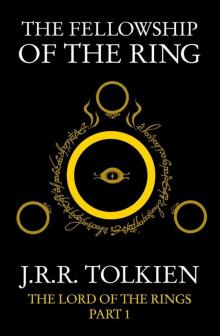 The Fellowship of the Ring
The Fellowship of the Ring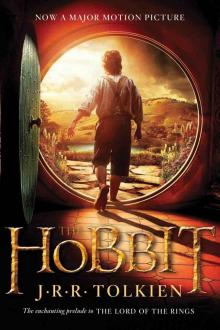 The Hobbit
The Hobbit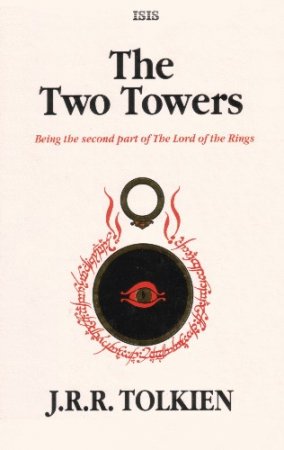 The Two Towers
The Two Towers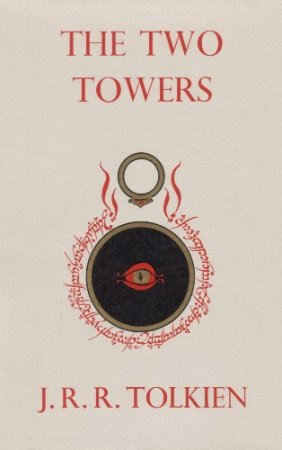 The Return of the King
The Return of the King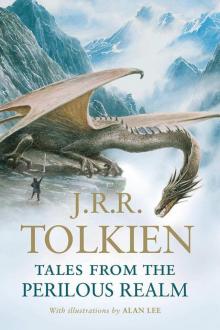 Tales From the Perilous Realm
Tales From the Perilous Realm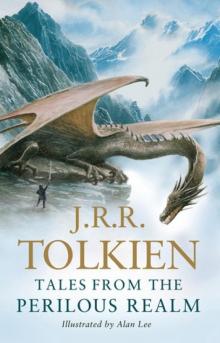 Leaf by Niggle
Leaf by Niggle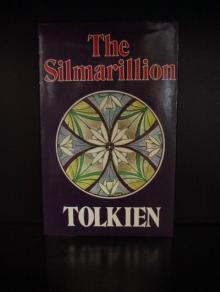 The Silmarillon
The Silmarillon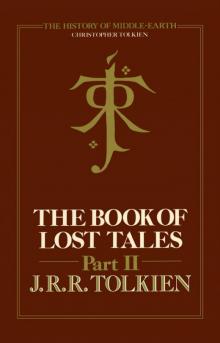 The Book of Lost Tales, Part Two
The Book of Lost Tales, Part Two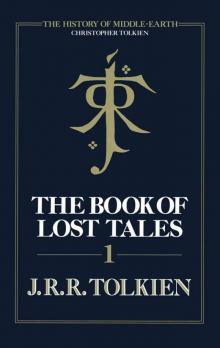 The Book of Lost Tales, Part One
The Book of Lost Tales, Part One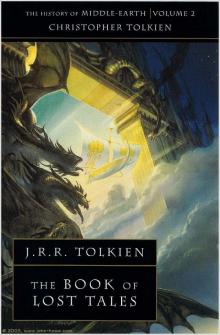 The Book of Lost Tales 2
The Book of Lost Tales 2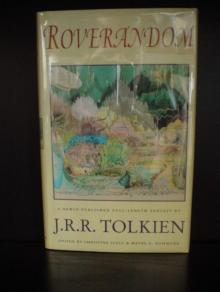 Roverandom
Roverandom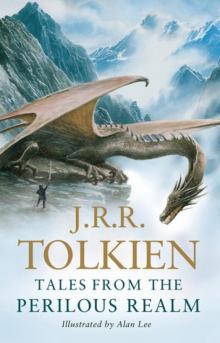 Smith of Wootton Major
Smith of Wootton Major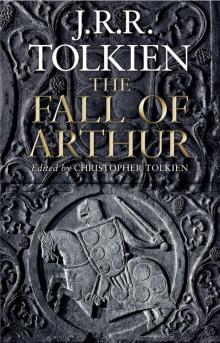 The Fall of Arthur
The Fall of Arthur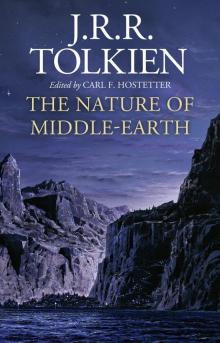 The Nature of Middle-earth
The Nature of Middle-earth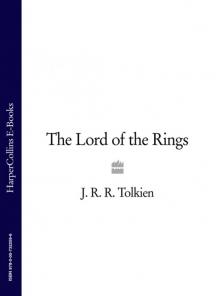 The Lord of the Rings: The Fellowship of the Ring, The Two Towers, The Return of the King
The Lord of the Rings: The Fellowship of the Ring, The Two Towers, The Return of the King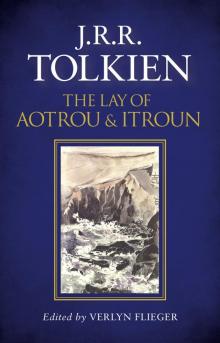 The Lay of Aotrou and Itroun
The Lay of Aotrou and Itroun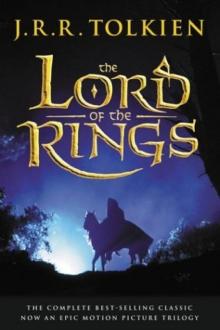 lord_rings.qxd
lord_rings.qxd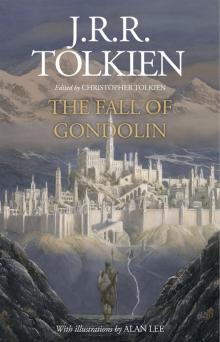 The Fall of Gondolin
The Fall of Gondolin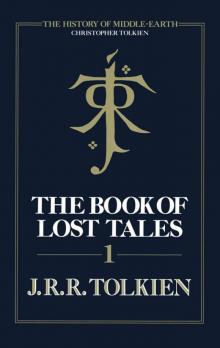 The Book of Lost Tales, Part 1
The Book of Lost Tales, Part 1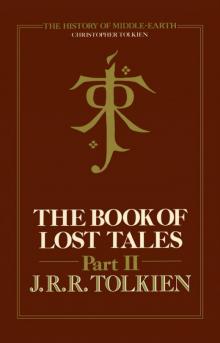 The Book of Lost Tales, Part 2
The Book of Lost Tales, Part 2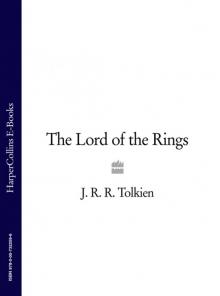 The Lord of the Rings
The Lord of the Rings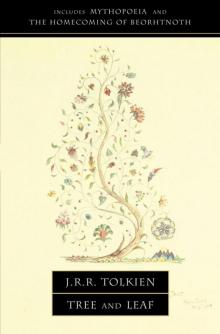 Tree and Leaf
Tree and Leaf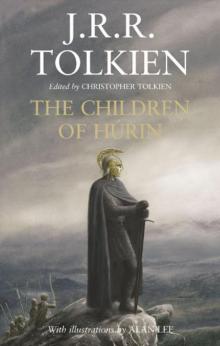 The Children of Húrin
The Children of Húrin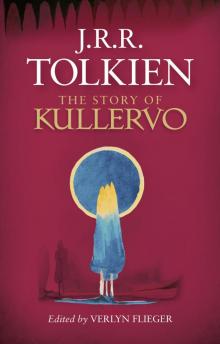 The Story of Kullervo
The Story of Kullervo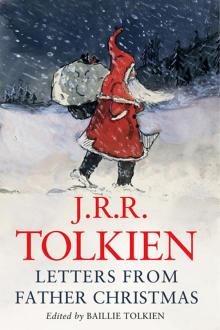 Letters From Father Christmas
Letters From Father Christmas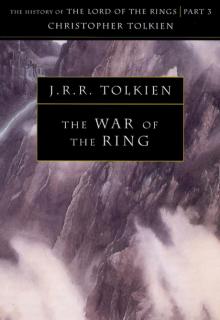 The History of Middle Earth: Volume 8 - The War of the Ring
The History of Middle Earth: Volume 8 - The War of the Ring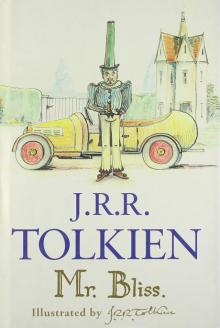 Mr. Bliss
Mr. Bliss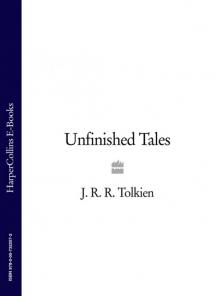 Unfinished Tales
Unfinished Tales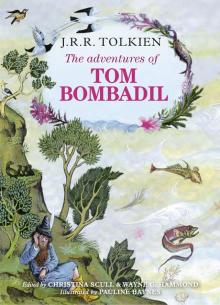 The Adventures of Tom Bombadil
The Adventures of Tom Bombadil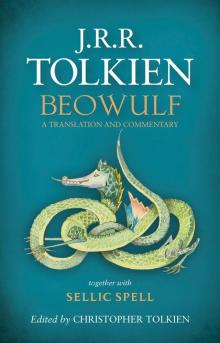 Beowulf: A Translation and Commentary, together with Sellic Spell
Beowulf: A Translation and Commentary, together with Sellic Spell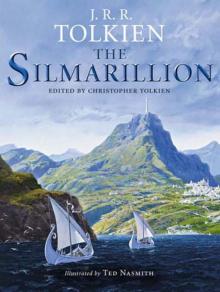 The Silmarillion
The Silmarillion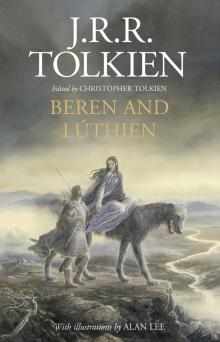 Beren and Lúthien
Beren and Lúthien